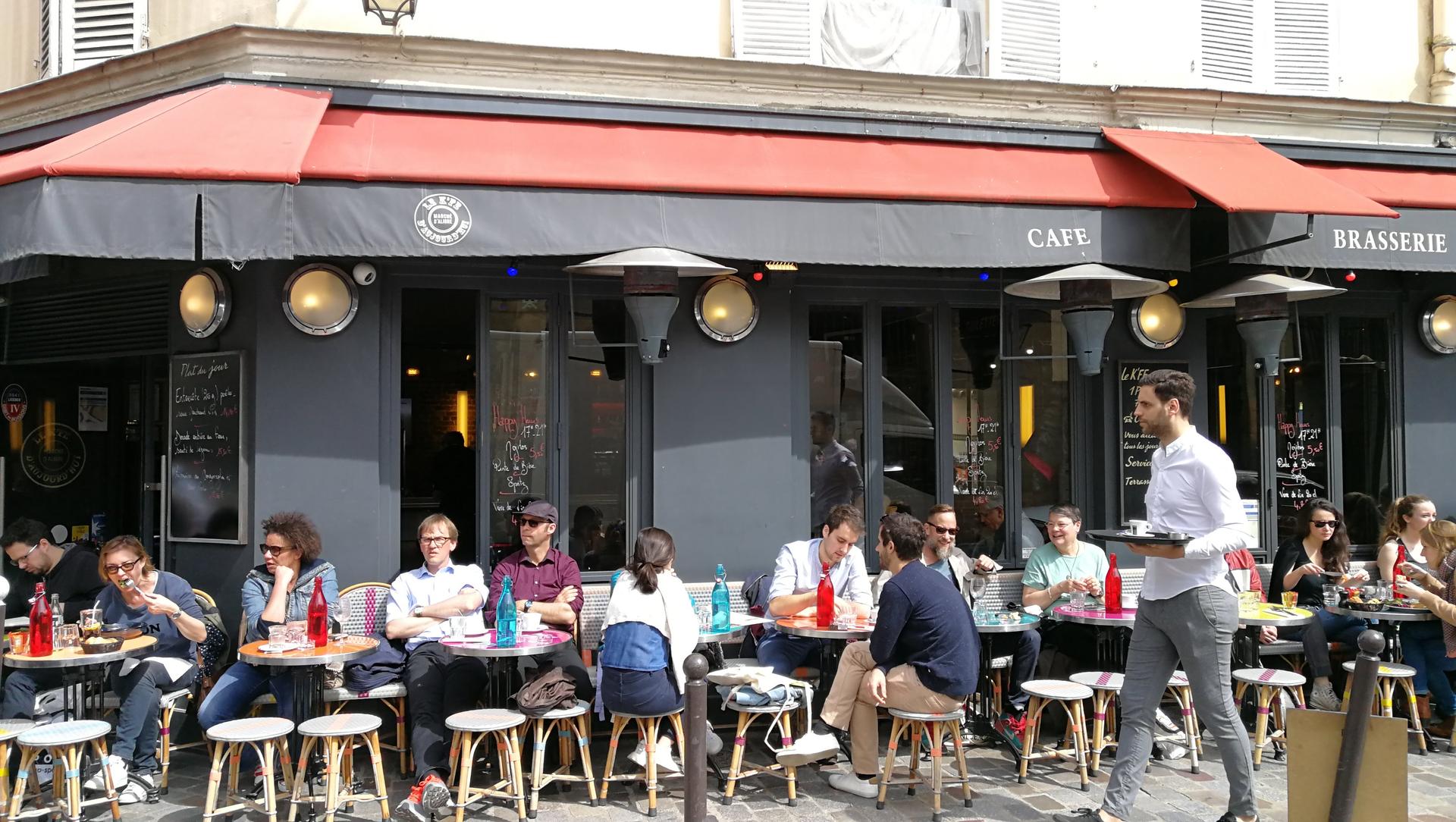It's still not the norm at restaurants in Paris to ask for a doggy bag. But the French government wants to change that.
At a sunny cafe terrace in the Paris neighborhood of Aligre, I am trying to finish a giant croque-monsieur — a typical French ham and grilled cheese sandwich — but it’s just atypically too big. So I get up to ask the manager if I can have a doggy bag for my leftovers.
“Un doggy bag?” he says. “No we don’t have any containers.”
When I point out that it may soon be mandatory for restaurants in France to provide them, he responds that he has no time for that — and no time to answer my questions either.
When I return to my table, someone has already cleared away my leftover croque-monsieur.
In France, even though millennials are getting used to the idea of taking home leftovers, asking for a doggy bag can still be a cultural faux pas. But the French government wants to crack down on food waste, especially in restaurants. A government study recently found that waste in restaurants is five times higher than in people’s homes. So the French parliament has just approved a new rule that, if finalized, would make it mandatory for restaurants to supply takeout containers for customers who request them.
It’s definitely not a French thing to do. And many tourists here are well aware of it.
“A doggy bag, where you bring leftovers home? I thought it was absolutely verboten," says Martha Palmer of Racine, Wisconsin, who is having lunch. She says she would welcome making the doggy bag a standard part of French dining. Palmer says she comes to France every spring with Ziploc bags hidden in her purse so she can sneak away with her leftovers.
“I do it under the table because I thought it was so improper,” Palmer says. “I didn’t want to hurt the chef’s feelings or the waiter’s feelings. You know, food is serious in France.”
So if food is so “serious” here — so sacred — why is it that we can’t honor it by taking it home when there is some left on our plate? What is the big taboo?
Chef François Pasteau runs the gourmet restaurant L’Épi Dupin in Paris, part of a group of restaurants here that offer “climate-conscious” menus. He says that there’s a “psychological block” when it comes to asking to take home your leftovers.
“Customers feel embarrassed because they’re afraid to look like cheapskates, like they can’t afford to pay for another meal,” Pasteau says. “They feel guilty about asking for a doggy bag, even though it would prevent food waste and would be smart to do so.”
Pasteau shows me the compostable food containers made of corn pulp that he keeps on hand at his restaurant. But he says in the two years since the government began advocating the use of doggy bags to reduce waste, only about 10 customers a year have asked for one.
Other French chefs I have spoken to say that traditionally a restaurant meal is something to be experienced under the careful watch of its own chef. It’s a matter of restaurant etiquette. There is a view in France that the concept of a dish belongs to the restaurant that created it, so when you take it home to reheat later, it’s as if you were degrading a masterpiece and rearranging it haphazardly.
Another issue for restaurants is the prospect of a new regulation.
“Once again we’re going to force a new regulation on owners and make them buy boxes,” says Jean Terlon, who runs a restaurant near Paris. He’s also affiliated with UMIH, a restaurant and hotel industry group.
Terlon says it’s fine for Americans to embrace the doggy bag tradition, “but they don’t fill plates the same way [in the US]. The concept of food is not the same.”
It’s true that portions have a lot to do with why you may not need a doggy bag in France, but you often do in the US. I should know. When I ate my first meal in New York City a couple of decades ago, I was overwhelmed by the enormous plate of bay scallops. But I felt completely humiliated when my friends asked for a doggy bag for me. I thought it was a joke at first, and then I almost died of shame when a friendly waiter brought my food in a bag.
Clearly, I’m over it now.
But even if France does go ahead with the proposed regulation, there is a still a major issue to address.
“The French care so much about their language. They’ve got to invent a better word than 'doggy bag,'” Martha Palmer says.
She’s right about that. The proposed rule suggests “gourmet bag” or simply boîte-à-emporter, which just means "takeout box." Jean Terlon of UMIH prefers the name reste avec moi — a play on the word restes, meaning both “stay” and “leftovers.”
“I am imagining the customer asking for a box of 'stay with me,’” Terlon says. “It’s got a Valentine’s Day ring to it.”
Maybe there is a way to salvage the all-American doggy bag and turn it into something French, after all.
The story you just read is accessible and free to all because thousands of listeners and readers contribute to our nonprofit newsroom. We go deep to bring you the human-centered international reporting that you know you can trust. To do this work and to do it well, we rely on the support of our listeners. If you appreciated our coverage this year, if there was a story that made you pause or a song that moved you, would you consider making a gift to sustain our work through 2024 and beyond?
